Podcast: Download (Duration: 27:09 — 25.0MB)
Get Notified Of Future Episodes Apple Podcasts | Spotify | Amazon Music | Android | Blubrry | Gaana | TuneIn | Deezer | Anghami | RSS | More
Episode highlights:
00:53 – A rare sort of specialty
01:54 – How times have changed
03:25 – Other musical guests we’ve seen
04:12 – Journeying beyond the classroom
06:24 – Figuring stuff out
08:56 – From smallest possible to 10X bigger
10:01 – The change in numbers
11:32 – When you own the racecourse…
14:43 – John’s book and how it’s going
17:34 – Before and after the strategy combo
19:57 – The differences in communication
21:43 – How time slows down
23:47 – A bit of parting advice
Want to work less and make more? James will help you
Transcription:
James: James Schramko here. Welcome back to SuperFastBusiness. This is Episode 697. And I’m chatting to John Henny. Welcome, John.
John: Thank you. So happy to be here.
A rare sort of specialty
James: John, you’ve got such a fascinating product to start with. I speak to lots of business owners. You’re a member of SuperFastBusiness membership. And I’d love you to share with our audience what you actually do because it’s kind of rare.
John: Yeah, I am a voice teacher in Los Angeles. And being in Los Angeles, you certainly do work with celebrities here and there. But the thing that I specialize in, I train other voice teachers in contemporary singing techniques. So I have an online voice teacher academy, as well as just getting ready to launch tomorrow a course on belt singing, which is an intense form of singing.
James: So you are the teacher to the teachers in LA.
John: Yeah.
James: That’s pretty Hollywood.
John: It is, it is. And I actually, I’ve done a fair amount of teaching trips. I’ve lectured in Australia, and Sydney and the UK, Japan, all around the US. And then I’ve got students in my academy from all over the world. So it’s really fun.
How times have changed
James: How good is it where we can have a skill or an expertise that would probably traditionally be taught on a fairly small scale, you know, like, maybe you have individual students initially when you’re starting out as a teacher, and then maybe you can speak to auditoriums or larger groups, but now you can reach people in every part of the world with your online business? I mean, that must have been a shift in the time you’ve been teaching.
John: Oh, it’s absolutely a shift. Even very early on, even before Skype, I was teaching distance lessons. I invested in one of those really expensive conference phones that were like $1500, that wouldn’t cancel each other out. It was, I forget what they call it, a two-way signal. But so I was teaching over the phone to all over the world. And now with Skype, and especially being able to launch courses, it’s remarkable. There is still some resistance to it in pockets of the voice teaching world. Some voice teachers don’t really like this idea of distance lessons, but I actually find that they work quite well.
James: Yeah, and is the sound quality good enough that you can detect the range of pitch? I don’t know the technical terms, but you can hear enough to be able to make small adjustments?
John: Yeah, it doesn’t work sometimes if the student is a real beginner, because there is a bit of lag time if you’re playing the piano to where they can follow it. So they have to have a pretty well-developed sense of pitch, but you can certainly hear the nuances in resonance and what’s going on with the vocal folds, the vowels. I find it works for me.
Other musical guests we’ve seen
James: So in previous episodes on SuperFastBusiness, we’ve spoken with some other musicians. We had Steve Mastroianni; we’ve had Scott Devine, he’s the bass guitar guy. Steve’s a guitarist.
John: Oh yeah, I know Steve. I’ve actually worked with Steve.
James: Right. And he’s such a nice guy, too. Massive heart.
John: Yeah.
James: Like, really generous person, who’s having tremendous success. I actually have to get him back on the show, because he’s just gone from stride to stride. And we’ve had James Eager, another bass guitarist. I love getting these musician case studies because there’s so many artists out there and creators and people who have mad skills, that are doing it on such a small scale. And I think what you’ve done is inspirational for others. Particularly in different markets. There’s probably piano teachers, or drummers or saxophone players who can derive the same sort of lessons that you’ve had to go through.
Journeying beyond the classroom
I just wonder, what did that journey look like for you when you started to identify that there was leverage beyond the classroom?
John: Yeah, the first thing I did was a little lecture on voice science and and why certain things happen in the voice. And to deliver it, I basically just set up a little PayPal button, and if somebody ordered it, I would physically go and see that the email would come in and respond with the link. I was doing it all myself. And I went, hey, there’s actually a bit of money to be made here. And then I really started to delve in and try and understand online marketing and course creation, and it’s a pretty serious rabbit hole. I thought learning to sing and being a musician was a rabbit hole. But it’s got its own complexities.
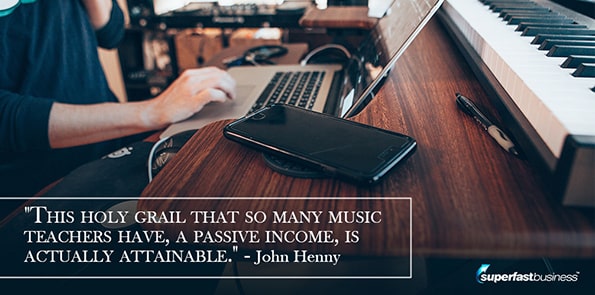
But as I began to get into it, I found that this holy grail that so many music teachers have, a passive income, is actually attainable. And it’s quite exciting. You don’t have to always be teaching one-on-one and only be earning when you’re sitting selling your time in half-hour or 60-minute blocks. You can wake up in the morning and have made as much money or more than a full day’s teaching. That’s quite thrilling and liberating.
James: Yeah, I don’t know if you ever get over that. When you can go on a holiday and come home with more money than what you spent on the holiday.
John: Yeah.
James: I remember the very first week where I cracked 1,000 dollars a day. I still had a job, and I was moving house at the time. And I put up an information product on the Warrior Forum as a Warrior special offer. And it was my XSP cheat sheet, teaching people how to use XSitePro software. And I remember the sales coming in every day, and I was just like, Wow. You know, like, if I could do this, instead of go to my job, then I could actually live off this. Because it was about the same as my wage. And that was the first moment that I had hoped that this is actually a possibility. And at the time with four kids, a mortgage, and pretty stressful General Manager’s role, it was the hope that I really needed, because I just didn’t want to keep deferring the rest of my life, you know, so that one day when I’m in my 60s, I might retire. I think we can shift gears a bit early.
Figuring stuff out
And I think what you’ve done is quite instructive, because as you started out online, you correctly said, this is a whole rabbit hole. I know when we go to local meetups for SuperFastBusiness, we kind of feel like we’re the aliens, you know, inhabiting a human pub. We’re chatting about things that normal people don’t talk about, like opt-ins and funnels and conversion rate optimization, etc. Where did you first go to try and figure this stuff out?
John: You know, I was just poking around online. But the real catalyst, I’ll tell you was, I was doing quite well as an independent voice teacher. And I somehow had this great idea of building this really large music academy with lots of employees, and this idea of if you build it, they will come and I quickly found out that that is not true. That’s only in the movies, and it began to lose money very rapidly, and I thought, you know, I’ve either need to just close this and take a huge loss, or I need to figure out how to market. And I hadn’t really had to do that just on my own as a voice teacher. And I began to study Facebook marketing and actually took a course. That’s a client of yours, Molly Pittman. And I used Molly’s techniques, and I very quickly was able to double and then triple the revenues coming into the music academy and got that into the black. And while I was hemorrhaging money with that, I tried to do a larger online product, which in retrospect, I made the rookie mistake of making it much too big and unwieldy. But it it really gave me a crash course in how to do this. So I took what I learned from that, also, the marketing, and began to build on it.
James: And you’ve recognized that it’s okay to go out and find people who have already mastered some of the aspects you’re trying to learn, and then to invest in yourself a little bit to speed up, probably much in the same way that your clients come to you. Was that a useful way to think about it? Like people come to you for help, so you can go and get help from others?
John: Absolutely. I mean, I really looked at it as an investment and investing in myself. And now, I constantly asked the question that I learned from you, which is not how, but who.
James: Yeah.
John: And that’s really become my focus.
“Get one layer back and get off the tools.”
James: And full credit to Dean Jackson for that phrase, which I always credit. I want to make sure that’s clear. I used to talk about it as one layer back, you know, get one layer back and get off the tools so that you don’t have to do things. But I think Dean articulated in a much better fashion, especially when it comes to seeking expertise.
From smallest possible to 10X bigger
A couple of things that we’ve talked about in our time together that have seen some changes in the way you’re doing business, I think at one point I was chatting to you about how big the course you might want to do should be. I’d love if you could speak to that.
John: Yeah, so the reason that I joined SuperFastBusiness is I found myself stuck in that, as they say, paralysis by analysis, and just having all kinds of ideas and not knowing what to work on. So I came to you and I said, hey, I’ve got all these ideas. And one of them was this belt-singing course. And you said, What’s the smallest possible version you can make of this course? And I thought about it and I said, Well, I can make a really short version that just goes into how belt works. And I threw that together in a couple of days. I think I shot all the videos in a day and threw it up. You had me put it in a low price point, and I immediately sold 100 copies. And then you said, Okay, now, what would it look like for a course that sold for 10 times as much? And so I now have that version of the course launching tomorrow.
The change in numbers
James: That’s very exciting. And did you see a change in revenue come through once you’ve released the course to your sort of daily average?
John: Yeah, well, there’s been a few things. Because I have that course, and then I also have my teacher training course, and I’ve got a science course. And the other thing that you had me do, I was podcasting. And the podcast just started off kind of as a lark. I just publish it whenever I felt like it. So I’d go a few months without an episode. And then I started to get more serious and you told me to publish twice a week. And so I got on that and my numbers just shot up. But also, I had more people approaching me about being on their podcasts, had people approached me about being affiliates for my products, which has boosted sales. So beyond the numbers of just the podcast, it just seems to be the whole sea is rising as a result.
James: Almost certainly. It’s such a conversion tool. It’s an authority builder. That’s also good discipline for you to stay in the game. I know doing podcasts is so educational for me, I learn a lot putting that effort into creating podcasts. And the more and more podcasts I publish, the greater body of work is out there for people to discover. And I get a whole new wave of people finding out about my programs. So I think over time, you’ll get a compound effect from that. Even the work you’ve done in the past is leveraged. It’s one of the most leveraged things you can do.
Also, since you are a voice professional, it would be such a shame not to capture that perfect sound and put it on the web.
When you own the racecourse…
John: Yeah, for me, it’s just become a great way to to capture somebody for 25, 30 minutes and really give them my point of views on singing and performance and how the voice works versus YouTube or Facebook where there are so many distractions coming at them all the time. And also, I really followed your advice of owning the racecourse.
James: Tell me about that.
John: Well, it’s just that idea of, and I see voice teachers do that – they spend all their time just jumping into Facebook groups and discussing or even arguing with voice teachers. And my thought was, you know, you could take this knowledge that you’re trying to give to people who don’t necessarily want to listen, and create your own product in your own space that is is not subject to your account being closed or anything like that. It’s yours, and you build your audience. You’re not trying to write out their audience.
And not that I don’t utilize social media. I also follow the videos that you do, the tips that you have for SuperFastBusiness, I do those as well. But the podcast is is really mine and I can control it in a way that I can’t with other social media.
“Podcasts are here to stay, and they’re definitely growing.”
James: Yeah. I think podcasts are here to stay, and they’re definitely growing. You know, ironically, a lot of the videos that I make are my response to people’s Facebook posts. I think there’s almost nothing less useful than wading into a Facebook debate. That’s just going to eat up a lot of time. And as it’s in the great book, like Dale Carnegie’s book, a man convinced against his will, is of the same opinion still. You’re not going to turn around these people.
“There’s almost nothing less useful than wading into a Facebook debate.”
But I often see these debates, and then I think, you know, I’m going to make a video about that. And then I’ll have that piece of content on my site, and then I’ll spread it across social media. And some of the more ranty or controversial ones do get really good traction. There’s people on social media, for the most part, seeking relief from the pain of boredom. And it’s a great way to repurpose that thought.
And I also have become way more disciplined as I mature. And I think, what could possibly be gained by me going in and having this debate with uneducated people who are just going to upset me? And I started just leaving groups that annoyed me, and I don’t spend much time on social media. But the videos will still draw out the people who want to have the discussion, but you’re in a much better position when it’s on your site, it’s your video, or you’re sharing on social media. Let them chat about give Facebook what they want, but it’s all-around your video with the URL in it. So it’s terrific marketing.
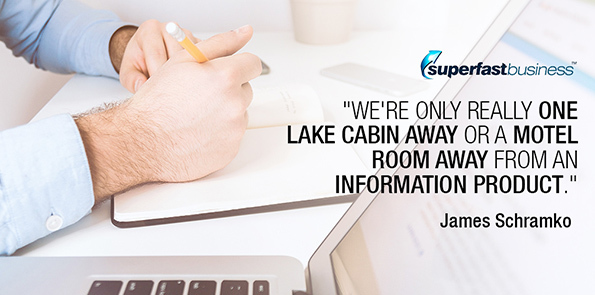 So you’ve taken a few really great concepts. You’ve got own the racecourse, you’re looking for who, not how, which I imagine stops you getting bogged down in the minutia. You created a minimum viable course and validated it immediately. And then as soon as you realize that there’s a market there, you’ve started to put in the effort for the expanded course. So rather than do what most people do, which is create the big expanded course first and wait a year, you got into the market instantly. And I love how you said you did it in just a day. I’ve often thought we’re only really one lake cabin away or a motel room away from an information product. Like, we could lock ourselves away for a weekend and emerge with the product. I’ve done it before. You’ve done it.
So you’ve taken a few really great concepts. You’ve got own the racecourse, you’re looking for who, not how, which I imagine stops you getting bogged down in the minutia. You created a minimum viable course and validated it immediately. And then as soon as you realize that there’s a market there, you’ve started to put in the effort for the expanded course. So rather than do what most people do, which is create the big expanded course first and wait a year, you got into the market instantly. And I love how you said you did it in just a day. I’ve often thought we’re only really one lake cabin away or a motel room away from an information product. Like, we could lock ourselves away for a weekend and emerge with the product. I’ve done it before. You’ve done it.
John’s book and how it’s going
You’ve got a book. Perhaps tell us how the book’s going.
John: Yeah, well, I published my first book earlier this year, called Teaching Contemporary Singing. And I managed to get it to be a bestseller in multiple categories on Amazon in a few different countries. So that was exciting. But my new one, and it’s funny, because I said to you, well, I’m working on this course, but I’m also working on this book, and I don’t know which I should do first, and you said, well, both would be great. So I said, Okay.
James: It’s probably the last thing you expected me to tell you as a coach.
John: Yeah. But you know what, it’s really made me focus in, and I’m getting more done than I ever have before. And it’s amazing, and I’m also doing the Pomodoro technique. And you talked about, oh, I’m forgetting the name of the law, where the task will take the time allotted to it.
James: Parkinson’s Law.
John: Parkinson’s Law. That’s it. And I have seen that in action for sure. So, giving myself deadlines – like I contact the editor for the book and tell him, you’ll have the manuscript on this day. And so then the clock is ticking on me. I managed to push through, so now the book, I could actually publish it a bit sooner, but I’m trying to get a bit of distance between the release of the course and the book. And just to make sure all the web materials are set up for the for the book, so that people will then opt in for extra bonuses, a bonus chapter. I’m stealing that from you as well.
James: Go for it.
John: Yeah.
James: Other things that work well with books that I’ve discovered, and I had some help from Kelly Exeter, put together a campaign on this, is when it’s in pre-release phase, you can ask people to pre-order and then send you their receipt, and you can send them a PDF of the book. And then once the book comes out, you can email them all and say, Hey, the book’s out. If you’ve read the book, and you want to leave a review, go for it. So you can generate enough sales out of the gate to get a good thing.
And lately, I’ve been running some Amazon ads. Their ad platform can work quite well; you can actually spend $1 and make a couple of dollars in sales back if you get the ratio right, if you have the right combination of bidding and the amount for that, and they’ll start promoting it within their platform. So that’s worked well. You’ll be able to use another Dean Jackson technique actually, the super signature. Once the new book’s out, and the course is out, you can just add them all into the bottom of your email footer, with, you know, here’s five ways I can help you. And you can list the book, and the course, and the podcast. And of course, all paths lead back to JohnHenny.com, the master website, and on there, maybe you have some kind of a chooser that helps people find the right product or service, if you have any for them.
John: Oh, yeah. I mean, I definitely have my list of what I’m going to do with the website. Again, following your lead of the kind of Ryan Levesque choose where you know, if someone’s a speaker, then I’ll have a path for them; if someone’s a voice teacher, if someone’s a singer, and break all that down.
Before and after the strategy combo
James: Exactly. So what we’ve done is we’ve really raided the cabinet of most of the good marketers for best practice, and we’ve assimilated that into a powerful combo for you. I’m interested if you’ve had a before-and-after transformation in terms of how the business is actually performing when you put some of these things in play.
John: Before and after, meaning…?
James: In terms of the revenue for your business or the profitability, have you experienced an uplift?
John: Oh, absolutely. Yes. In the six months before I signed up for SuperFastBusiness, I think online I was going along, I did about 20-something thousand. And then the six months after, and I think it’s almost six months to the day since I joined SuperFastBusiness, that’s gone to over $40,000.
James: So it’s doubled.
John: It’s doubled. And it just keeps moving up every month. And this was without doing any major release. I’ve been spending most of that time prepping these two new projects to come out, the belting course and then my new book – I forgot to say what it’s about, but it’s going to be called Voice Teacher Influencer, and it’s to help voice teachers expand their reach if they are considering podcasting or creating passive income, how they can stand out from the crowd.
James: Yeah, and you’re definitely in a great position to be the authority on that. You’ve got leadership all over you.
So really, where you’ve got to now is just off the back of some small changes, like increasing your consistency and frequency, by owning more of your content, starting at a minimum viable product. It’s going to be pretty exciting when all your courses and books drop into your current ecosystem and then you just keep rolling that snowball, it’s going to get bigger and more powerful. And you’ll have the wonder of compound working in your favor, so life’s going to be pretty good. I imagine at some point, you’ll be picking and choosing the jobs you want.
John: Yeah, I mean, that’s the thing, is when you’re teaching, it’s, if you’re not behind the piano working, you’re not earning. And this is really changing things for me. And I foresee in the next year, my passive income will probably exceed my teaching income.
James: Well, that’s fantastic.
John: Yeah. And that’s kind of rare in this business.
James: It is rare. I mean, it’s great that we’re having a chat about it – super generous of you to share this. I’m curious, from a stylistic point of view, you’re a teacher and a coach and you’ve got different types of students. Obviously, in my case, you’ve been a tremendous student, because you actually do the things I talk about, and they work, which is fortuitous for both of us.
The differences in communication
What sort of difference have you found with the way that we’re communicating together inside SuperFastBusiness membership – and you can also involve the other members there if you’ve had interactions with them – versus how you’ve been learning before online?
John: I find that SuperFastBusiness is a really good information filter for me, because otherwise I’m just bouncing around online, I’m getting overwhelmed. And so SuperFastBusiness really clarifies things for me. And also just the general vibe and feel of the membership, it’s really supportive but it doesn’t have that over-hyped entrepreneur hustle kind of vibe going. I tried to do the hustle thing, and I thought, you know, I’m just collapsing. I can’t do this. And I was just completely overwhelmed. Your style of doing things, the way that you’re able to work really hard when you’re working but also experience life and have everything really structured and doing things that make sense, really works for me. And I find that you’ve assembled a group of people of like mind. It’s a really warm crowd.
James: They’re definitely attracted to that. I’ve been a member of some other memberships and groups. In fact, the reason I started my membership is I was a member of other groups, and I wanted to create a group that was the solution to the problem that a lot of these groups had. One, in fact, was that the owners of the groups were never present. And then the opposite I’ve seen lately is where the owners or the founders are just in your face every five seconds, just bombing Facebook groups. They’re sending you 15 emails a day and they’re just way overpopulating your inbox or your space. And it’s just like, get out of my face. We’re definitely more laid back.
How time slows down
But I wonder if you’ve experienced what I’ve experienced, and that is when you start working on the right things, and you realize that you don’t have to do everything. You just have to do the right things. And you can do them in a reasonable time frame and they work. Do you find that time starts to slow down a little bit for you? Is it a little less frantic and your adrenal gland gets a bit of a break?
John: I do. I mean, between joining this group, practicing mindfulness meditation every day, which I’ve gotten better at, I’m calming down a lot. To be honest, just because I’ve got the course and the book coming out together, these past few weeks, I’ve been giving a pretty hard push, but I know that that’s temporary. And I can go back to then just being really mindful of doing the right things in their own time, rather than I got to be hustling – Wait, why am I sitting? I’ve got to be moving, moving, moving or I’m not going to accomplish anything. That mindset, thankfully, is pretty much gone for me.
“It’s good to have the choice and the freedom to work on things that really motivate and excite you.”
James: I think you’re back in the driver’s seat and you’re not worried about what other people think you need to be doing, and that’s very empowering. And it’s also, I think, really important for anyone who’s a bit creative. It’s good to have the choice and the freedom to work on things that really motivate and excite you. And I find you tremendously inspirational. You’re just quietly and very humbly plotting your way there with right move after right move. And nothing groundbreaking. Like you said, you haven’t put stress on your business prior to a big launch, or you’re not betting the house on a new Facebook agency or something. You are just quietly moving the pieces around, getting them in order, getting the results and showing great signs of a continued trend line. And I think next year and the year after for you is just going to be amazing, because you’re still quite early into it, compared to where this is going.
But most importantly, I think you’re going to create a lot of value for those voice teachers who come into your program, and who want to learn some of the things you’ve already discovered. And you’ve put forward the investment in time and money and energy to forge a pathway for them, and they’re just going to be able to pop into line, consume your well-thought-out and accurate information, and get results. So power to you.
A bit of parting advice
I really thank you for coming along and sharing this. And I’d also be interested in what sort of advice would you have for someone who is perhaps good at what they do, like you’re a teacher; maybe they’re an expert, or someone who’s sort of going it alone a bit and doing it a bit manually. What would you say the first few steps might be for them?
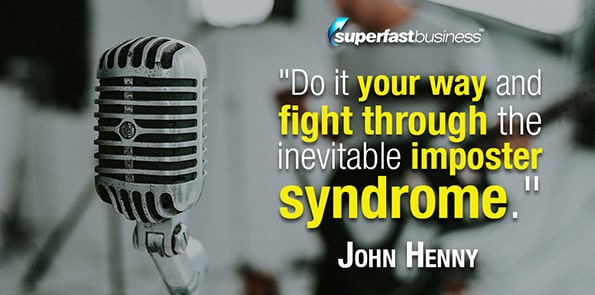
John: I think the first step is just getting really mentally clear that it’s not about doing something groundbreaking, but it’s about it being you. People want to learn from you. So it’s that idea. You don’t have to come up with something nobody’s ever done. Just do it your way and fight through the inevitable imposter syndrome. Don’t worry about the critics. Just trust that there’s an audience out there. If you’re helping people in your own studio, and people really seek you out for the way you teach, then there are others outside of your geographical area that are going to be the same.
James: Wow, that’s good advice. I could almost imagine you have a similar conversation with voice students. Because how many times have songs been sung? You know, the lyrics are all published.
John: Absolutely.
James: We’ve heard all the songs before. I guess you have to do it in your own way.
 John: Absolutely. You know, great artists, because people will ask me, Who’s your favorite singer? And it’s not always the most technically perfect singer, but it’s the singer that very uniquely can communicate emotion and intention and just really grab you with a song. It doesn’t have to be technically perfect.
John: Absolutely. You know, great artists, because people will ask me, Who’s your favorite singer? And it’s not always the most technically perfect singer, but it’s the singer that very uniquely can communicate emotion and intention and just really grab you with a song. It doesn’t have to be technically perfect.
James: I think that describes Robert Plant.
John: Oh, yeah.
James: You know, I saw him perform in the Sydney Opera House very recently, and I’d never seen him live before. And I’ve been listening to those songs since my youth, since the days of my youth. And to hear him sing just a few meters in front of me, it just put little tears in my eyes; I felt the emotion. And he can’t even remember half the songs or reach half the pitch that he used to be able to do. I don’t know if that’s right. He couldn’t hit the high notes anymore. He doesn’t remember some of the lyrics. But gee, it’s emotional. And it was amazing. Such an experience, and it was like a life moment, that particular moment, to hear those songs live that I’ve heard so many times recorded. And I think what that band did well was take everyone else’s songs, allegedly from the first four albums, and just do them way better than the originals and and do them with such precision and skill that they became world-class.
John: Well, yeah. I mean, it was the magic of Plant and Jimmy Page and then John Bonham. And just, you know, to take blues and then just to do it so huge and heavy was, it was something otherworldly.
James: Amazing.
Well, this has been super enjoyable. John Henny, thank you so much. If you want to learn from John, especially if you’ve got anything to do with voice, you should head over to JohnHenny.com. If you’ve enjoyed this episode or you got a few tips from it, be sure to comment where you see this. This is Episode 697. I’m James Schramko, this is SuperFastBusiness.com. Thank you so much for listening. Thank you, John.
John: Thank you.
Still selling time for money? That can change when you join JamesSchramko membership
Liked the show? Get all the episodes when you subscribe on iTunes
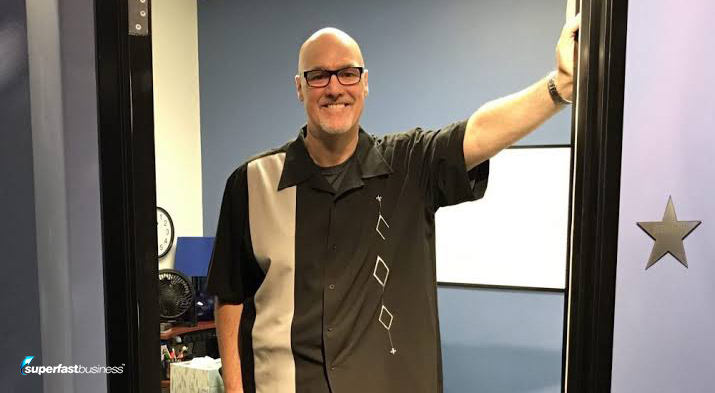
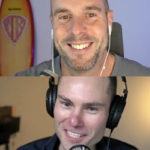








Leave a Reply